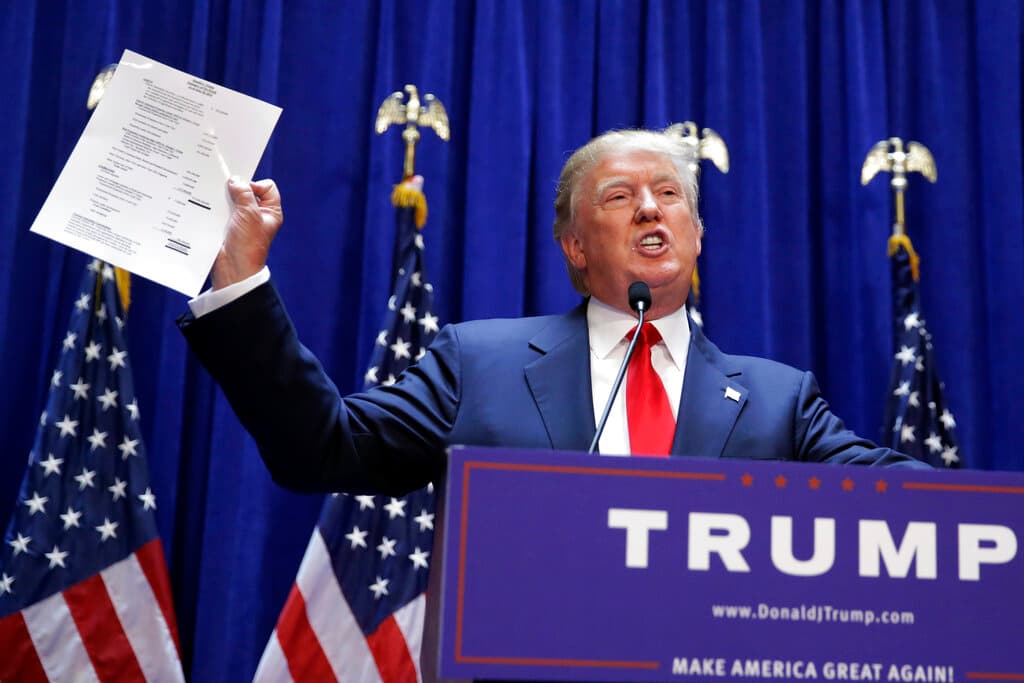The Busted Flush of the Press
Columbia Journalism Review offers a post-mortem on how biased coverage of President Trump sparked a collapse in press credibility.

The news in Columbia Journalism Review’s series, by Jeff Gerth, on the coverage of President Trump is not that the press went all in on a busted flush. That’s old news to readers of the Wall Street Journal, New York Post, and our own modest columns, among others. Until 2016, Mr. Gerth reports, “most Americans trusted the traditional media.” Today, though, America’s press “has the lowest credibility — 26 percent — among forty-six nations.”
We’d trace the problem back to August 2016, when the New York Times — the leader of the journalistic pack — endorsed the abandonment, when covering Mr. Trump, of the cardinal rule of journalism: objectivity. The Times’ own media maven, Jim Rutenberg, ran a front-page column that sought, it seemed, to give cover to those toiling in the galleys of the press to indulge their disdain — politically and personally — for Mr. Trump.
“If you’re a working journalist,” Mr. Rutenberg began, “and you believe that Donald J. Trump is a demagogue playing to the nation’s worst racist and nationalistic tendencies,” and that “he would be dangerous with control of the United States nuclear codes, how the heck are you supposed to cover him?” The idea, for Mr. Rutenberg, was that new rules were needed to cover this “abnormal and potentially dangerous candidate.”
Mr. Rutenberg conceded this would require throwing out “the textbook American journalism has been using for the better part of the past half-century.” Yet upon considering that “a Trump presidency” is “potentially dangerous, then your reporting is going to reflect that.” It would require reporters, Mr. Rutenberg reckoned, to “move closer than you’ve ever been to being oppositional,” even if that made them “uncomfortable.”
The Times’ own senior editor for politics chimed in to call Mr. Trump’s candidacy “extraordinary and precedent-shattering” and contended that for reporters “to pretend otherwise is to be disingenuous with readers.” So, Mr. Rutenberg reckoned, best to be away with any notion of “fairness.” Instead, he spoke of a vocation “to be true to the readers and viewers, and true to the facts, in a way that will stand up to history’s judgment.”
The Times’ managing editor, Dean Baquet, endorsed that point as the election neared, noting Mr. Rutenberg “nailed it” and that Mr. Trump had led the Gray Lady to cover politics in a new way. “He will have changed journalism,” Mr. Baquet said. No longer did the Times feel a need to present both sides when the facts are in dispute. “Trump has ended that struggle,” Mr. Baquet asserted. “We fact-check him. We write it more powerfully that it’s false.”
After the election, Mr. Baquet and the Times’ publisher, Arthur Sulzberger Jr., seemed to grasp the scale of their default, asking in a letter to readers whether Mr. Trump’s “sheer unconventionality” had led “us and other news outlets to underestimate his support among American voters.” They vowed to do better: “we aim to rededicate ourselves to the fundamental mission of Times journalism,” pledging “to report America and the world honestly.”
The hollowness of that promise is meticulously traced in CJR’s account of how the press sabotaged Mr. Trump’s presidency by “going all in on efforts to catalogue Trump as a threat to the country,” CJR’s editor, Kyle Pope, writes. Is it any wonder that the press’ reputation collapsed? By 2021, Mr. Gerth says “83 percent of Americans saw ‘fake news’ as a ‘problem,’” and a majority see the press as “truly the enemy of the American people.”
Similarly, recent Gallup polling shows just seven percent of Americans have “a great deal” of trust in the “mass media” to cover news “fully, accurately and fairly.” Yet the Washington Post’s Leonard Downie just penned an op-ed suggesting newsrooms that “move beyond ‘objectivity’ can build trust.” It supports Mr. Gerth’s conclusion that, in the aftermath of Trump’s presidency, “the damage to the credibility of the Times and its peers persists.”

